50 Years Of Doctor Who - Peter Davison Interview
"I thought I'd be quickly forgotten, but it didn’t work out like that."
As Doctor Who hurtles towards its half-century, SFX speaks to Peter Davison, the Time Lord's cricket-crazed 'fifth man in'. "Tom Baker wasn't a major threat in my mind," he tells us...
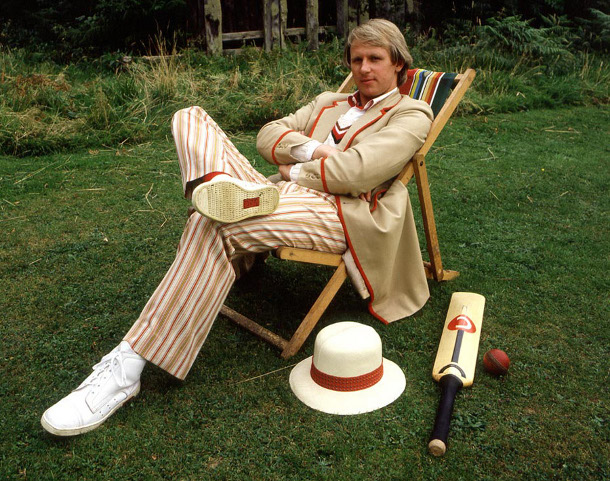
We’re celebrating 50 years of Doctor Who . Can you imagine where the show will be in 2063? Is it a phenomenon that just can’t die now?
When I did it, during the classic period as it’s now been designated, it was very, very popular and brought the BBC lots of income, but it really wasn’t a prestigious programme. It just wasn’t. And when it came back under Russell T Davies it quickly became the BBC’s most prestigious programme, and along with that, of course, everything sort of went up – you had better directors, writers, actors. So as long as they can keep to those high standards I don’t see why it shouldn’t go on and on. The great thing about Doctor Who is that it’s begun to regenerate itself. When Doctor Who came back it came back because those people had grown up watching the classic series, had become writers, directors and actors, and they are now running the asylum. And so as long as there more people out there – and I’m sure there are – watching Doctor Who , and wanting to write for Doctor Who , when these writers we have now like Steven, Mark and Russell want to go off and do other things, there’ll be other people waiting, saying “I’ve got this really great idea for Doctor Who , I want to do this…” If you think about it, the canvas is limitless. You’ve got the whole of history past, you’ve got the future ahead of us and the contemporary world as they see it to write stories about. You’re not going to really run out of stories to tell. Hopefully! I think you probably won’t. It could easily carry on and on.
Did you realise how much playing the Doctor would impact on your life?
It gradually dawned on me. John Nathan-Turner [producer] was really good at getting publicity for the programme, and that in turn meant conventions and appearances and the programme became more popular in America and Australia. We had a circuit – they would fly us to America and we were just thrilled someone was flying us to America. And Jon Pertwee would be there and Patrick Troughton would suddenly join this bandwagon. So you realised that it probably wouldn’t go away after I left. I didn’t really anticipate it carrying on for as long as it did, but certainly it gradually emerged. When I took the part I had no idea it was going to be like that. I thought you’d finish and then you’d be quickly forgotten, but it didn’t work out like that.
Did you experience any negativity from fans of Tom Baker’s Doctor?
I’m absolutely sure that’s out there, but you kind of don’t hear it. Probably part of you thinks “I’m not going to hear it.” When you go somewhere, the people who come up to you are people who like you, so all I really hear – and I’m very happy to hear this! – is people who come up and go “Oh, you were my Doctor!”. So I probably get a completely false impression of how people reacted to me – but that’s fine! When I was offered the part I thought I was too young. But unfortunately – or fortunately, depending on how you look at it – if you’re a fan of Doctor Who and you get offered the part of the Doctor you can’t really turn it down. You just can’t. You might think “Oh, I’m not sure about this,” but in the end you just think “I’ve got to do this.” Once I got over that, once I’d made that decision, I wasn’t really intimidated by Tom’s presence. To me I was more intimidated by the fact that I was taking over from William Hartnell and Patrick Troughton. I hadn’t really watched Tom – I’d seen the odd episode – not because I didn’t like him but simply because at that time I’d been at drama school, I’d been out there working in theatre and things like that, and you just tend not to see it. So although I was aware of how he did the part, he wasn’t a major threat in my mind.
Get sneak previews, exclusive competitions and details of special events each month!
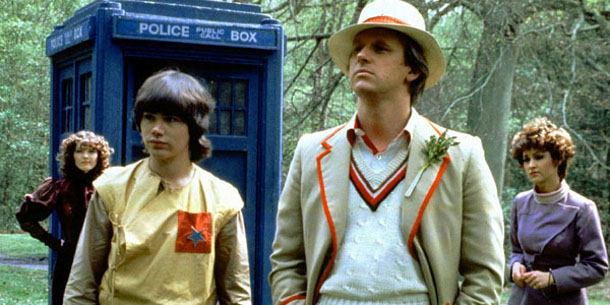
Were you ever frustrated playing the Doctor?
I suppose if I look back I was frustrated by it, but I was never under any illusions I had any control over how I played it. The main problem was that during Tom’s time what John Nathan-Turner called undergraduate humour had crept in, which I loved. That was really under the auspices of Douglas Adams, together with Tom. We had a sort of iron curtain coming down on any humour. We weren’t allowed to put anything in, so that was a great shame, because I usually like to put those things in. I don’t think I fought hard enough to get it back again. I probably could have fought harder, if I look back on it, but I suppose it didn’t seem a battle that I could win at that point, so I didn’t fight it. I regret that a little bit, but there you go. We’d try and get bits in and they’d usually be taken out during the producer’s run. To be candid, I think I was always aware that Tom had been a little too confrontational and I think I was probably trying to prove that I wasn’t at all. It didn’t really do me any favours.
Do you see elements of your take in Doctors that have come after you?
Certainly I tried to introduce a kind of fallibility, a vulnerable side to the Doctor – the idea that he was doing it for the best intentions but he wasn’t always quite sure he was doing the right thing. There’s always that moral dilemma. We seemed to have an increasing body count during my time as the Doctor and the only way we could get round that is by justifying it as “sometimes these things have to happen in order to save people down the line”. It seems to be the way we approach the world now! So yeah, I introduced that side, and I think David Tennant particularly picked up on that, of not being quite sure of whether he was on the right track and not being in total control all the time.
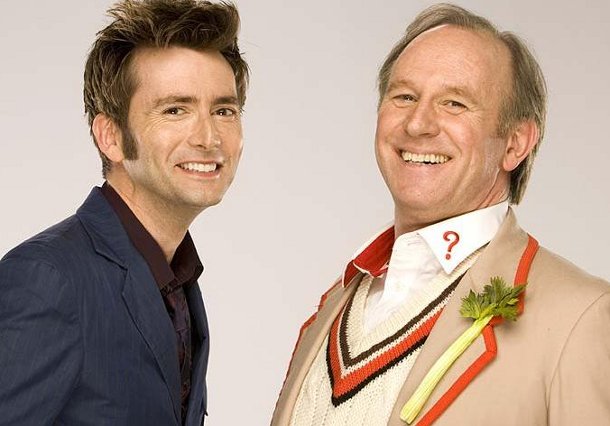
Head to the next page for Peter's thoughts on companions, Capaldi and a female Doctor...
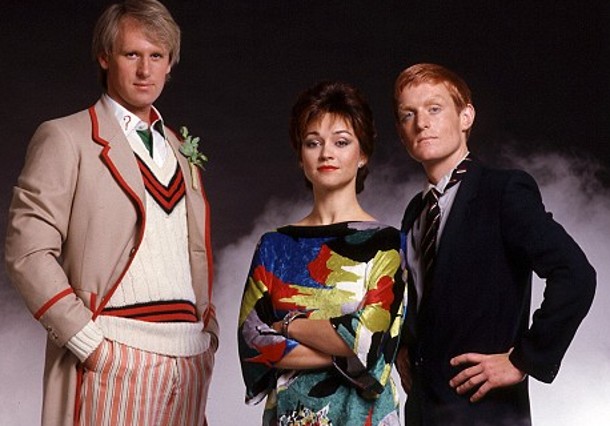
How do you think the role of the companion has changed since your time on the series?
I think personally that they struggled with companions as the modern world encroached on Doctor Who . They struggled to get the companions right and they wanted to do the right thing, they wanted to make them interesting and challenging, just a better part, really, and I don’t think they really managed it until Rose, if I’m honest with you. She was the first companion that worked as a proper, rounded character – other than that they were obviously there to get into trouble and take a sub-storyline off in a certain direction. It was difficult. Tegan, one of my companions, basically her storyline was she didn’t want to be there. I had Turlough who was trying to kill me the whole time… but it didn’t really work. I could see what they were trying to do, and of course the answer was you just write a damn good character. I think that’s what Russell managed to do with Rose. Obviously the performance was great as well. There’s an argument which I’ve heard which says that in that first series, when Doctor Who came back, Rose was actually the more important character, more important than the Doctor, and it’s not far off.
Did you get to keep any mementos from your time as the Doctor?
Am I allowed to say that? I do have the jacket, actually! Come and get it if you dare! In that first flush after you leave you keep various things and then people will get in touch with you and say “Oh, we’ve got this charity auction, can you give us something?” And you give away the most stupid things. You think “Why on earth was I doing that?” I gave away my shoes from the series after about two months! I thought “What have I done? It was my pension!”
How much influence did you have over the fact that your Doctor was cricket-mad?
I suggested the theme of the cricketing – the costume I had no part in designing. I rather liked the idea that he went into his TARDIS wardrobe and just hoiked out a few things that would match up, loosely based on a cricketing outfit. They then went away and designed this… it wouldn’t have been my choice in the sense that it was sort of a designer outfit. It was the first of the designer Doctor outfits, really. But I got used to it, and it was very comfortable, so I’ve no real complaint with it. I always had a slight worry about the question marks on the collar, which seemed to have become a theme by that time, as if to say “Doctor who?” It seemed to be slightly obvious, slightly ludicrous, slightly too much showmanship about that! Nevertheless, I suppose you just buy into it. I think now I probably would have said no, I’m not going to have that. I had the idea of cricket because I like cricket, simple as that. Funnily enough I’ve just come from a lunch at Lords, and they had a TARDIS in the Long Room! It was just extraordinary. And Daleks there, and all these great old cricketers posing with Daleks! You just think “Whoa, this is something else…”
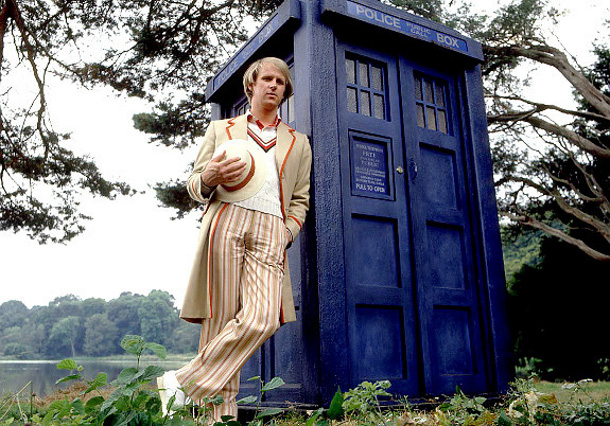
Doctor Who always attracts a loyal following, but does the sheer scale of that interest still boggle you?
It certainly does in terms of me . Although I carried this slight insecurity about being too young for a long time, certainly when the series came back and we had a succession of young Doctors, from this perspective I can look back and I seem far more a part of the scheme of things. It’s almost like I started a trend, I like to think! I think the younger viewers, or the children who are my children’s age, they’re more aware of the old Doctors. They went back and the one they gravitated to was me, because of the younger Doctors, because that’s what they’re used to. And now the fanbase in terms of me has massively widened, so when I appear somewhere there are lots of children coming up and saying “Can I have your autograph?” They’re probably slightly shocked by the fact that I don’t quite look as I did in 1981, but never mind…
What do you think of Peter Capaldi’s casting as the Doctor?
I think it’s a great idea. They couldn’t in all honesty have gone much younger – they obviously had to go older, so why not go to the other end of the spectrum? Obviously I grew up with older Doctors. I’m sure that he’ll get a bit of flak from fans watching it, for the opposite reason that I did. I was much younger than the previous Doctors, he’s going to be much older. I know my son was saying “Not sure I’m going to like him, I like Matt Smith, cos he’s young like me…” And I said “Well, just watch, because I grew up with the older Doctors and I loved them, just loved them.” So I’m sure he’ll sit there and watch the first episode with trepidation and then at the end of it go “Yeah!”
Do you have a favourite Doctor yourself?
Patrick Troughton is my Doctor. I think that he had the most difficult job because he was the first regeneration. It could have gone horribly wrong. We’d all got used to William Hartnell and we all liked him as the Doctor. I remember thinking “Hmm, not sure about this, another Doctor…” And then by the time you’d watched the first episode of Patrick’s you were just won over, because he had such an extraordinary way of doing it. I think under his Doctor the programme really started to blossom.
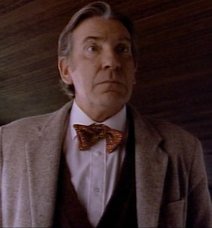
Is there an actor - or actress - you've always wanted to see play the Doctor?
I always thought David Warner would have been a brilliant choice as the Doctor. I suggested that. I tried to get him the job. I’ve been trying to get him the job for years, actually! When it was first mooted that Doctor Who was coming back and I was asked about this I just thought of David… I think he has that edge to his acting that would have been just perfect for Doctor Who.
And an actress?
I’ve always had a slight problem with this idea of the possibility of a female Doctor, because in my mind it’s not as if the genders are interchangeable on Gallifrey. I think it works much the same way that Earth does, so it would be like saying “How about having a female James Bond?” You just wouldn’t think about it. I’m very happy for there to be a female Time Lord – in fact, as it stands at this moment my daughter is in fact a female Time Lord, whizzing about the galaxy somewhere, so they can always bring her back! But I’ve never quite understood this thing of “Oh, will it be a female Doctor?”, because it would basically be a sex change. There are females on Gallifrey and there are males on Gallifrey, and this happens to be a male Time Lord.
The dating scene would be hell…
Exactly, yes! Although, very modern …
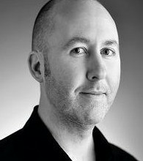
Nick Setchfield is the Editor-at-Large for SFX Magazine, writing features, reviews, interviews, and more for the monthly issues. However, he is also a freelance journalist and author with Titan Books. His original novels are called The War in the Dark, and The Spider Dance. He's also written a book on James Bond called Mission Statements.


